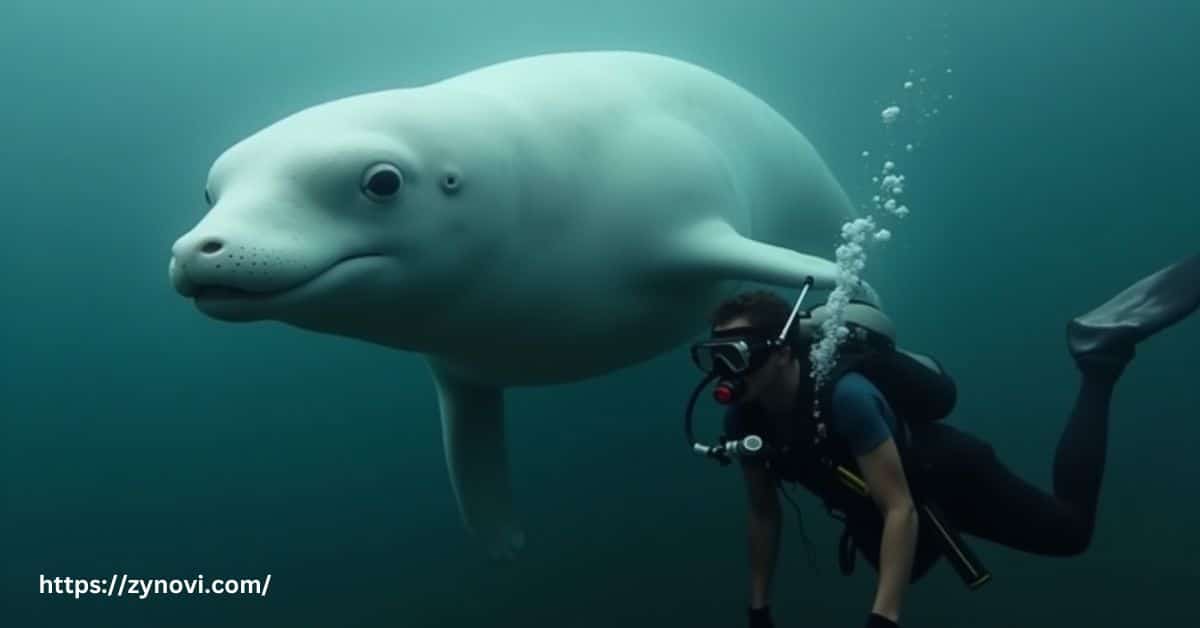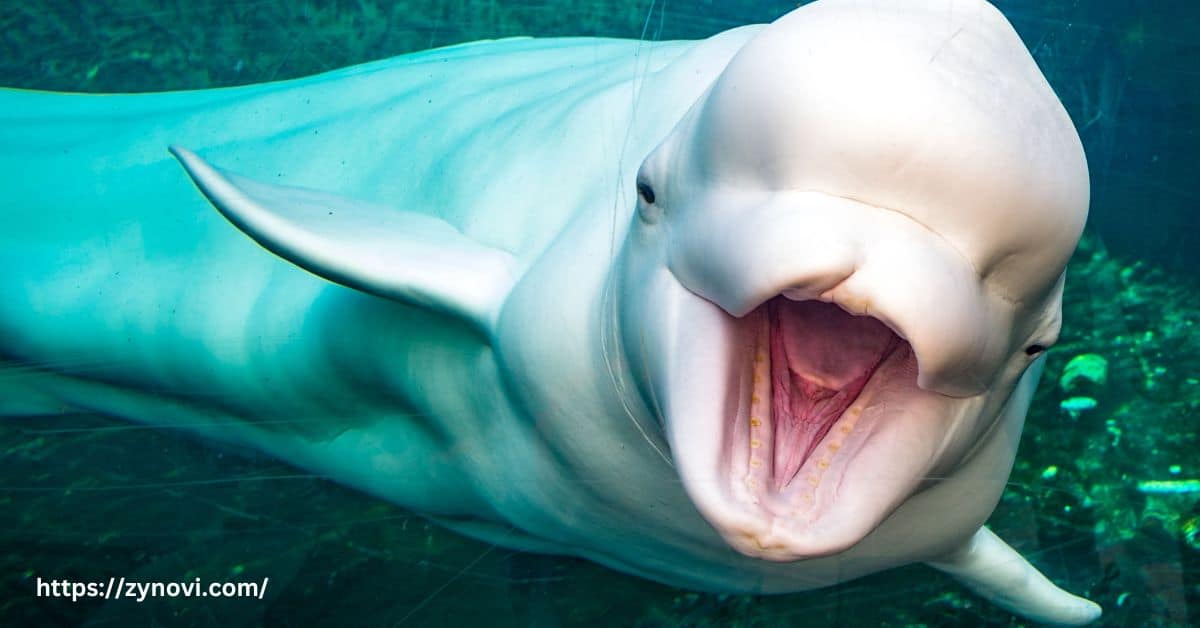Do Beluga Whales Attack Humans? Beluga whales do not typically attack humans; they are generally gentle and curious creatures.
These enchanting Arctic marine mammals captivate the imagination with their playful nature and striking white appearance. But could their curiosity ever turn dangerous? Whether you’re planning a whale-watching adventure or simply curious about these gentle giants, understanding their behavior is key.
You’re about to jump into the fascinating world of beluga whales. From their unique social traits to recorded human interactions, this guide will reveal why they’re considered some of the friendliest creatures in the ocean and how to stay safe during your encounters.
Understanding Beluga Whales
Beluga whales (Delphinapterus leucas) are instantly recognizable by their striking white skin, which acts as an effective camouflage in the icy Arctic waters.
Their rounded forehead, known as the “melon,” is a specialized organ used for echolocation, enabling them to navigate and hunt efficiently underwater.
Unlike many other whales, belugas lack a dorsal fin, a unique adaptation that allows them to move seamlessly beneath the Arctic ice. These features make them well-suited to their harsh environment.
Physical Characteristics and Unique Features
| Physical Characteristic | Details |
|---|---|
| Length | 13 to 20 feet (4 to 6 meters) |
| Weight | 2,000 to 3,500 pounds (900 to 1,600 kilograms) |
| Distinctive Traits | Rounded forehead (“melon”) for echolocation, thick layer of blubber for insulation |
| Adaptations | Lack of dorsal fin allows easier navigation under ice |
| Habitat | Arctic and sub-Arctic regions, including the Canadian Arctic, Alaska, and parts of Russia |
Habitat and Distribution
Beluga whales thrive in the Arctic and sub-Arctic regions, adapting to seasonal changes in their environment.
- During summer, they frequent shallow coastal areas and river estuaries, where food is abundant and the water is warmer.
- In winter, they migrate to deeper offshore waters, often under thick ice. These highly social animals live in pods that can range in size from small groups of a few individuals to massive gatherings of hundreds, showcasing their strong social bonds.
Diet and Feeding Habits
Beluga whales have a diverse diet, primarily consisting of fish, such as salmon and herring, along with squid and various crustaceans like shrimp and crabs.
They are opportunistic feeders, adapting to the availability of prey in their environment. Their advanced echolocation abilities allow them to hunt effectively, even in murky or dark waters, by identifying and pinpointing prey with precision.
This hunting strategy makes belugas highly efficient predators in their Arctic habitat.
Social Structure and Communication
- Beluga whales are renowned for their highly social nature and advanced communication skills.
- Living in pods, they form strong bonds and cooperate in activities like hunting and migration.
- Their vocalizations, such as clicks, whistles, and squeals, have earned them the nickname “sea canaries”, reflecting their diverse acoustic repertoire.
- Additionally, belugas exhibit playful behaviors like breaching and spy-hopping, showcasing their intelligence and curiosity.
- These traits underline their reputation as one of the most communicative marine mammals.
Do Beluga Whales Attack Humans?

General Temperament
Do Beluga Whales Attack Humans? Beluga whales are celebrated for their gentle and non-aggressive nature, making them a favorite among marine enthusiasts.
Naturally curious, they often approach boats or divers, driven by interest rather than hostility. Their strong social bonds within pods foster cooperative behaviors, such as group hunting and protecting vulnerable members.
This innate curiosity and cooperative temperament highlight their peaceful disposition, contributing to their reputation as one of the most approachable marine mammals.
Behavior in the Wild
In the wild, beluga whales generally interact peacefully with humans. However, rare instances of aggression are often connected to specific triggers, such as:
- Stress or Threats: When belugas perceive potential danger, particularly to their calves, they may act defensively to protect their pod.
- Unfamiliarity: Sudden, abrupt movements or loud noises can startle belugas, causing them to react cautiously or retreat to avoid potential threats.
Encounters in Captivity
Belugas in captivity, such as those trained for the U.S. Naval Marine Mammal Program or showcased in aquariums and marine parks, often display playful and engaging behaviors, showcasing their curiosity and social nature.
However, the confined environment can sometimes lead to stress-related behaviors, such as repetitive movements or changes in vocalization patterns.
These signs of stress can sometimes result in misunderstandings during human interactions, as the whales may react unpredictably due to the unnatural conditions of captivity.
Documented Incidents and Analysis
While attacks by beluga whales are exceptionally rare, a few notable incidents have been documented:
- 2009 Chinese Aquarium Incident: In a remarkable event, a beluga whale in a Chinese aquarium rescued a diver by pushing her to the surface, showcasing their potential for empathy and protective instincts.
- Nudging or Pulling Swimmers: Belugas have been known to nudge or gently pull at swimmers during encounters. These actions, however, are typically playful and exploratory, rather than signs of aggression.
Why Are Beluga Whales Considered Gentle?

Natural Curiosity and Playfulness
Beluga whales are renowned for their natural curiosity and playful demeanor. These highly intelligent and social animals often approach humans with genuine interest, observing and sometimes engaging in interactions.
This behavior stems from their inquisitive nature, which drives them to explore their surroundings. In many cases, belugas have been seen playing with objects, engaging in friendly gestures toward divers, or observing boats.
Their curiosity reflects a deep sense of awareness and connection to their environment.
Adaptations for Non-Aggression
Beluga whales have evolved unique adaptations for non-aggression, setting them apart from more territorial predators like orcas.
As opportunistic feeders, belugas focus on consuming fish, squid, and crustaceans rather than engaging in competitive hunting.
Their social structure emphasizes cooperation within pods, which often consist of family groups that work together for navigation, protection, and feeding.
This evolutionary focus on harmony rather than dominance fosters their gentle and curious nature, making them less prone to aggression.
Indigenous and Cultural Perceptions
- Among Arctic Indigenous communities, beluga whales hold significant cultural and spiritual value.
- They are often seen as symbols of harmony and interconnectedness, reflecting their peaceful nature.
- In many traditional stories and legends, belugas are depicted as gentle beings that help maintain balance in the ocean ecosystem.
These cultural perceptions also emphasize the whale’s role in sustaining life, as Indigenous peoples have relied on belugas for food and materials, fostering a deep respect for these marine mammals.
Are Beluga Whale Interactions Dangerous?
Potential Risks in Wild Encounters
While belugas are generally safe to interact with, risks include:
Accidental Injuries: Despite their gentle nature, belugas’ large size and strength mean that even playful behaviors, like nudging or pulling, can unintentionally cause harm to humans.
Unpredictable Behavior: If belugas feel threatened or startled by sudden movements or loud noises, they may react defensively. Such situations are rare but should be approached with caution.
Situations That Could Lead to Aggression
Protecting Calves: Belugas are attentive and protective parents. If a calf is nearby, adults may perceive humans or other animals as a threat, leading to defensive behaviors.
Crowded Environments: Overcrowding in captivity, such as in small aquariums, or human over-intrusion in their natural habitat can lead to stress, potentially resulting in agitation or defensive actions.
Comparison with Other Marine Mammals
| Marine Mammal | Temperament | Interaction with Humans | Notable Behavior |
|---|---|---|---|
| Beluga Whales | Gentle, curious | Safe and non-aggressive | Calm, curiosity-driven, cooperative |
| Dolphins | Playful, occasionally assertive | Generally friendly, but can display dominance | Playful, social, sometimes assertive |
| Orcas | Dominant, apex predators | Rarely interact safely, can be aggressive | Predatory, displays of dominance |
How to Safely Interact with Beluga Whales

Guidelines for Observing in the Wild
- Maintain Distance: Stay at least 100 meters away to respect their space and avoid causing them stress or altering their natural behavior.
- Avoid Touching or Feeding: Human interference, such as feeding or attempting to touch belugas, can disrupt their routines and may pose safety risks to both humans and the animals.
- Be Quiet and Respectful: Loud noises, sudden movements, or erratic gestures can startle belugas, potentially causing them to become defensive or flee.
Ethical Considerations in Captivity
- Recognize Signs of Stress: Look for behaviors such as pacing, floating motionless, or erratic swimming, which may indicate the beluga is stressed or uncomfortable. Avoid attempting interaction during such times.
- Support Ethical Facilities: Choose to visit aquariums or marine parks that emphasize conservation, spacious habitats, and animal welfare, ensuring a better quality of life for the belugas in their care.
Tips for Eco-Tourism
- Choose Eco-Friendly Whale-Watching Tours: Opt for companies that follow responsible tourism practices, such as maintaining safe distances, using non-intrusive boats, and adhering to local regulations to minimize environmental impact.
- Advocate for Marine Life Protection Policies: Support initiatives and organizations working on marine conservation laws, such as reducing ocean pollution, regulating fishing practices, and protecting beluga habitats from human interference.
Final Verdict
Belugas are overwhelmingly gentle and non-aggressive, with only rare incidents of defensive behavior. Their natural curiosity often results in playful interactions with humans.
While it’s tempting to approach these fascinating creatures, respecting their space ensures safety for both humans and belugas.
FAQs
Can belugas be aggressive?
Belugas are not naturally aggressive; any aggressive behavior is usually a response to stress or perceived threats.
Is it safe to touch beluga whales?
It’s not recommended to touch beluga whales as it can disrupt their natural behavior and cause stress.
What whale is aggressive to humans?
Orcas, also known as killer whales, are the most aggressive whales towards humans due to their predatory nature.
Do beluga whales like to play with humans?
Yes, belugas are curious and playful, often approaching humans out of interest, but interactions should always be respectful.
Conclusion: Do Beluga Whales Attack Humans?
Beluga whales are renowned for their gentle and friendly nature, making them one of the safest marine mammals for human interaction. While rare incidents have occurred, these are usually misunderstandings rather than acts of aggression. Their social behavior, curiosity, and intelligence often lead them to approach humans with interest rather than hostility.
By adhering to proper guidelines such as maintaining a respectful distance, avoiding feeding, and supporting conservation efforts we can ensure safe and memorable encounters with these remarkable creatures while helping preserve their natural habitats for future generations.










